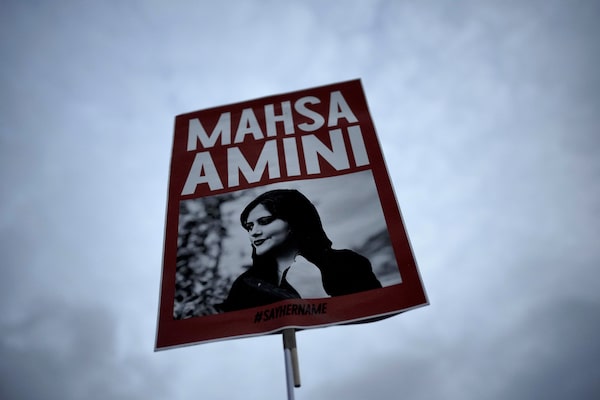
A woman holds a placard with a picture of Iranian woman Mahsa Amini during a protest against her death, in Berlin, on Sept. 28, 2022.Markus Schreiber/The Associated Press
Iranian security forces deployed in the hometown of Mahsa Amini in anticipation of a flare-up in unrest marking this weekend’s first anniversary of her death in morality police custody, witnesses, social media posts and rights groups said on Friday.
The death on Sept. 16 of Amini, a 22-year-old Kurd arrested for allegedly flouting the Islamic Republic’s mandatory dress code, sparked months of anti-government protests that spiralled into the biggest show of opposition to the authorities in years.
Many, with women and young people often at the forefront, called for an end to more than four decades of Shi’ite clerical rule. Over 500 people including 71 minors were killed in the protests, hundreds injured and thousands arrested in unrest that was eventually crushed by security forces, rights groups said.
In Amini’s birthplace in Iran’s western province of Kurdistan, a rights activist said there was a “heavy presence of security forces”.
Another activist said a small gathering of protesters chanted anti-government slogans before quickly dispersing.
The activists spoke on condition of anonymity, citing a fear of government reprisals amid a growing clampdown on dissent as the anniversary approached.
Social media posts spoke of security force deployments in several cities, mainly within Kurdistan. The reports could not be immediately verified.
In a statement, the Norway-based human rights group Hengaw said several Kurdish cities in western Iran “have experienced an atmosphere of intimidation and the declaration of a state of war in recent days”. It said numerous citizens had been detained.
Hengaw added that military personnel were positioned on top of Tapeh Qawkh, a hill overlooking Saqez, while residents had witnessed a surge in helicopter activity over the city.
Social media posts quoted Saqez residents as saying that authorities had installed new surveillance cameras around the city, apparently to monitor and identify protesters.
Reuters could not verify any of these accounts.
On Friday, web monitor Netblocks reported “significant disruption to internet connectivity in the (southeastern city of) Zahedan … targeting anti-government protests … on the eve of the anniversary of Mahsa Amini’s death”. Social media postings said weekly protests were held in Zahedan on Friday with slogans including “Death or freedom”.
Authorities have accused the United States and Israel and their local agents of fomenting the unrest to destabilize Iran.
In a statement on Friday, U.S. President Joe Biden said: “Mahsa’s story did not end with her brutal death. She inspired a historic movement – Woman, Life, Freedom – that has impacted Iran and influenced people across the globe.”
“We reaffirm our commitment to the courageous people of Iran … And together with our allies and partners, we stand with them,” Biden added.
Without naming Biden, Iran’s Foreign Ministry spokesperson Nasser Kanaani rejected as “double standards and lies” Western expressions of support for women’s rights in Iran. His posting on the X platform was accompanied by videos apparently showing mistreatment of women by Western and Israeli police.
Britain on Friday imposed sanctions on four Iranian officials and the United States said it was sanctioning more than two dozen individuals and entities connected to Iran’s “violent suppression” of protests.
In a report last month, Amnesty International said Iranian authorities “have been subjecting victims’ families to arbitrary arrest and detention, imposing cruel restrictions on peaceful gatherings at grave sites, and destroying victims’ gravestones”. Security forces detained Amini’s uncle Safa Aeli on Sept. 5, relatives told Reuters.
Many journalists, lawyers, activists, students, academics, artists, public figures and members of ethnic minorities accused of links with the protest wave, as well as relatives of protesters killed in the unrest, have been arrested, summoned, threatened or fired from jobs in the past few weeks, according to Iranian and Western human rights groups. Iran’s Etemad daily reported in August that the lawyer for Amini’s family also faced charges of “propaganda against the system”. If convicted, Saleh Nikbakht faces a jail sentence of between one and three years.
The United States and Britain, along with the European Union, have announced multiple rounds of sanctions against Iran, citing the widespread and often violent crackdown on protests after the death of Amini.
“Mahsa’s tragic and senseless death in the custody of Iran’s so-called ‘Morality Police’ sparked demonstrations across Iran that were met with unspeakable violence, mass arrests, systemic internet disruptions and censorship by the Iranian regime,” U.S. Secretary of State Antony Blinken said in a statement.
“We will continue to take appropriate action, alongside our international partners, to hold accountable those who suppress Iranians’ exercise of human rights,” he said, adding that Canada, Australia, and other partners were also imposing sanctions this week.
The U.S. Treasury Department in a separate statement said it imposed sanctions on more than two dozen people and entities it said were connected to Iran’s “violent suppression” of protests in the wake of Amini’s death its crack down on dissenting voices and restrictions to internet.
The action targets 29 people and groups, including 18 key members of the Islamic Revolutionary Guard Corps (IRGC) and Iran’s Law Enforcement Forces (LEF), as well as the head of Iran’s Prisons Organizations, the department said. They also target officials linked to Iran’s internet blockade and several media outlets.
The sanctions target LEF spokesperson Saeed Montazerolmehdi, multiple LEF and IRGC commanders, and Iran’s Prisons Organization chief Gholamali Mohammadi.
Douran Software Technologies CEO Alireza Abedinejad as well as state-controlled media organizations Press TV, Tasnim News Agency and Fars News were also among those sanctioned.
“The United States … will continue to take collective action against those who suppress Iranians’ exercise of their human rights,” the Treasury’s Under Secretary for Terrorism and Financial Intelligence, Brian Nelson, said in the statement.
Britain separately announced its sanctions targeting senior Iranian decision makers enforcing Tehran’s mandatory hijab law, including Iran’s minister for culture and Islamic guidance, his deputy, the mayor of Tehran and an Iranian police spokesman.